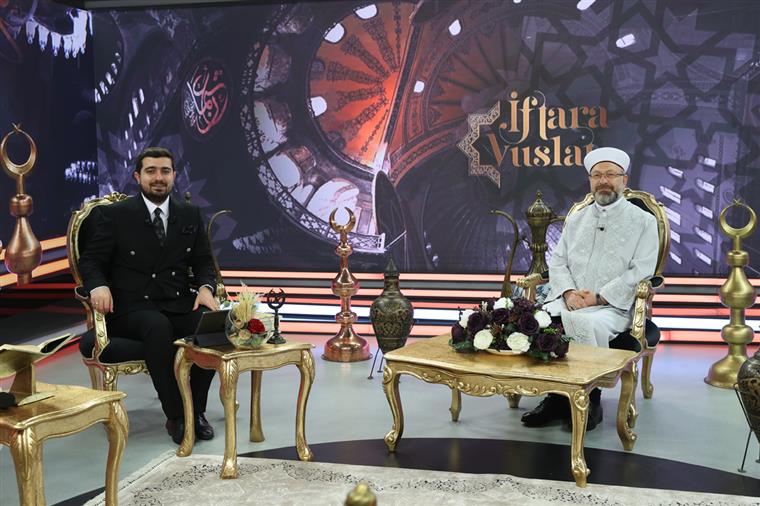“Namaza ne kadar önem veriyorsak zekata da o kadar önem vermeliyiz”

Akit TV’de “İftara Vuslat” programına katılan Diyanet İşleri Başkanı Prof. Dr. Ali Erbaş, “Biz eğer zekatımızı hakkıyla vermezsek Müslümanlığımızı tam yapmış sayılmayız. Namaza, oruca, hacca ne kadar önem veriyorsak zekata da o kadar önem vermeliyiz.” dedi
Diyanet İşleri Başkanı Prof. Dr. Ali Erbaş, Akit TV ekranlarından canlı olarak yayınlanan “İftara Vuslat” programına katıldı.
Programda, ibadetlerin önemine değinen Diyanet İşleri Başkanı Erbaş, Ramazan ayının müminlerin kurtuluşu için bir vesile olduğunu söyledi.
Recep, Şaban aylarından sonra Ramazan ayına kavuşmanın mutluluğu içerisinde olduklarını ifade eden Başkan Erbaş, “Üç ay önce Rabbimize dua ettik dedik ki, ‘Ya Rabbi Recep ve Şaban aylarını bizim için mübarek kıl ve bizi Ramazan ayına ulaştır.’ Duamızı kabul etti Rabbimiz, Ramazan Ayı'na ulaştık. Recep ve Şaban aylarını değerlendirmeye gayret ettik, inşallah bereketinden istifade etmişizdir.” dedi.
Başkan Erbaş, Ramazan ayının başının rahmet, ortasının mağfiret, sonunun ise günahlardan kurtuluş olduğunu hatırlatarak, “Ramazan ayının ilk on gününde Rabbimizden rahmet umduk, inşallah istifade etmişizdir. İkinci 10 gününde mağfiret için gayret ettik. Muttakiler için hazırlanan cennete ve mağfirete koşunuz buyuruyor Rabbimiz. Muhsin olabilmek için mağfirete konuşmak lazım. Mağfiretin sonunda cennetin olduğunu Allah teala müjdeliyor. Bu müjdeye koşmak lazım.” diye konuştu.
“Bir küçük tebessüm bile bir sadakadır”
Varlıkta da darlıkta da infak etmenin muttakilerin bir özelliği olduğunu belirten Başkan Erbaş, şöyle devam etti:
“Muttaki olmak lazım. Darlıkta da varlıkta da infakın yolunu aramak lazım. Varlıkta infakı anladık, darlıkta infak nasıl olur? O da, öfkeyi tutarlar diyor. Öfkeyi tutmak da bir infaktır. Kardeşinin yüzüne tebessümle bakmak da bir infaktır. ‘Kardeşinin yüzüne tebessümle bakman bir sadakadır’ buyuruyor Peygamber Efendimiz. Demek ki infak etmek için, sadaka vermek için illa varlıklı olmak gerekmiyor. Bir küçük tebessüm bile bir sadakadır. İnsanların bazı olaylar karşısında öfkesini tutması, sabretmesi, tahammül etmesi bunlar da esasında işte mağfirete giden yolları döşeyen tuğlalardır. Böyle Muhsin olunuyor. Allah da muhsinleri seviyor. İnşallah bu mağfiret günlerinde, rahmet günlerinde muhsin olmuşuzdur, mağfirete ulaşmışızdır. Netice itibariyle son şu anda içinde bulunduğumuz son on gün, Cehennem azabından Kurtuluş günleridir. Müminlerin nihai hedefi kurtuluşa ulaşmaktır. Bu kurtuluşun en önemli yönlerinden birisi de cehennem azabından kurtulmaktır.”
“Başımızdaki en büyük imtihanlardan birisi, bizi ilgilendirmeyen şeylerle vaktimizi öldürmektir”
Başkan Erbaş, müminlerin özelliklerini ayetlerle anlatarak, “Mümine boş şeyle meşgul olmak yakışmaz. Malayani diyoruz. Bugün bizim başımızdaki en büyük imtihanlardan, en büyük musibetlerden, belalardan birisi de bize ait olmayan, bizi ilgilendirmeyen şeylerle vaktimizi harcamak, vaktimizi öldürmektir.” değerlendirmesinde bulundu.
Kur’an-ı Kerim’in Ramazan ayında inmeye başladığını hatırlatan Başkan Erbaş, “Ramazan ayında orucun ve namazın ardından en çok meşgul olacağımız ibadet Kur'an tilaveti olmalı. Kur'an-ı Kerim okumak ibadettir. Harfleri telaffuz etmek, Peygamber Efendimiz buyuruyor ki, ‘Kur'an'ın her harfine 10 hasene vardır. Elif lam mim, bir harftir demiyorum. Elif bir harf, Lam bir harf, mim bir harf.’ Çok açık açık anlatıyor Allah rasulü Efendimiz. Kur'an-ı Kerim'de binlerce harf var ona göre büyük bir ibadet olduğunu anlatmak için esasında böyle açık bir hadis-i şerif buyuruyor Peygamber Efendimiz. Bu hakikaten müminler için çok büyük bir fırsattır. Biz diyoruz ki Kur'an ayında her Müslüman hiç olmazsa bir hatim indirsin.” şeklinde konuştu.
“Çocuklarımızın karakterleri, İslam ahlakından uzak olarak oluşmasın istiyoruz”
Başkan Erbaş, 4-6 yaş Kur’an kurslarında yapılan eğitimlerin önemine değinerek şunları söyledi:
“Diyanet İşleri Başkanlığı olarak geçen yıl salgın öncesinde 200 bine yakın çocuğa ulaştık, hamdolsun. Ülkemizin her ilinde, ilçesinde elhamdülillah mutlaka (4-6 yaş Kur’an kursu) var. Çocuklarımız küçük yaşta sevgi, saygı nedir, abdest, namaz nedir öğrensinler. Peygamberimiz çocukları çok sevdiği gerçeğini çocuklarımıza ne zaman öğreteceğiz, bu yaşlarda öğreteceğiz. Peygamber Efendimizin çok güzel bir hadis-i şerifi var. Buyuruyor ki, ‘Çocuklarınız 7 yaşına gelinceye kadar onlara temel dini bilgiler onlara öğretiniz.’ Sevgiyi, saygıyı dürüstlüğü, evrensel değerleri çocuklarınıza öğretiniz. Anne babaya karşı saygı, anne baba sevgisi, ‘Büyüklerine saygı göstermeyen, küçüklerine sevgi göstermeyen bizden değildir’ buyuruyor Peygamber Efendimiz. Biz bunları 7 yaşına kadar öğretmemiz lazım. Müslümanlar olarak bizler çocuklarımızın karakter yapısının oluşmasında etkili olmalıyız. Başkalarına bırakmamalıyız. Çocuklarımızın karakterleri, İslam ahlakından, Kur'an’ın ilkelerinden, sünnetin ilkelerinden uzak olarak oluşmasın. Bu bizim için çok önemli bir sorumluluktur. Çünkü Kur'an-ı Kerim'de, ‘Çocuklarınızı yakıtı taşlar olan cehennem ateşinden koruyunuz.’ buyuruyor Rabbimiz.”
“Salgın ortamında çevrimiçi irşat programlarına ağırlık veriyoruz”
Başkan Erbaş, salgın tedbirleri nedeniyle Kur’an kurslarının kapalı olduğunu ama çevrim içi olarak dijital ortamlarda Kur’an eğitimlerinin devam ettiğini ifade ederek, “Diyanet İşleri Başkanlığı olarak her zaman olduğu gibi Ramazan ayında da milletimizin hizmetindeyiz. Özellikle bu salgın dönemlerinde dijital ortamlarda, çevrimiçi irşat programlarına ağırlık veriyoruz ki bu görevimizi, her zaman, her şartta ve her ortamda yerine getirelim.” diye konuştu.
Zekat’ın önemine vurgu yapan Başkan Erbaş, “Herkes komşunu gözetecek. Mahallesi'ni gözetecek. Bir yerde fakirlik varsa oraya zekat mükellefi insanlar hemen müdahale edecek, oraya koşacak. “Komşusu açken tok yatan bizden değildir” diyen bir Peygamberin ümmeti olarak biz eğer zekatımızı hakkıyla vermezsek Müslümanlığımızı tam yapmış sayılmayız. Namaza, oruca, hacca ne kadar önem veriyorsak zekata da o kadar önem vermeliyiz.” ifadelerini kullandı.
“Camilerinin bir köşesini hayır marketi haline getiren hocalarımız oldu”
Anadolu insanının tarih boyunca sadece yaşadığı yerde değil nerede bir mazlum, bir mağdur varsa onun yanında her zaman yer aldığının altını çizen Başkan Erbaş, “Sadece Türkiye Diyanet Vakfı olarak hem yurtiçinde 81 ilimizde, 922 ilçemizde mazlumun, mağdurun yanında hep yer aldık. Bir mahallenin hocası, o mahalledeki fakir fukarayı tespit etmiş, geçmişten bize kadar gelen ‘zimem defteri’ denilen bir uygulama var. O mahalledeki fakir fukara insanların bakkala, markete olan borçlarını onların haberi olmadan ödemiş elhamdülillah. Belki bunlar çok kamuoyuna yansımıyor. Dolayısıyla diyoruz ki, iyi ki hocalarımız var. İyi ki camilerimiz bu şekilde sadece namaz kılınan yerler olarak değerlendirilmiyor. Salgın döneminde camilerinin bir köşesini hayır marketi haline getiren hocalarımız oldu. Böyle onlarca örnek var. Biz şu an salgına rağmen çeşitli riskleri de olmasına rağmen 78 ülkede Türkiye Diyanet Vakfı gönüllüleri ile insanların fakir fukara, garip gureba, mazlum, mağdur insanların iftar ve sahur sofralarıyla onların yanındayız.” şeklinde konuştu.
“Bir mazlumun durumu eğer beni rahatsız etmiyorsa Müslümanlığımda bir eksiklik var demektir”
Başkan Erbaş iki hafta önce Suriye’nin İdlip kentine yapmış olduğu ziyareti değerlendirerek şunları söyledi:
“Çeşitli yönlerden riskli bir ziyaretti ama bu riskler bizim ‘Beklenen Sensin’ davetine icabet etmemizi engelleyemez. Kardeşlerin seni bekliyor, diyoruz değil mi? Türkiye Diyanet Vakfı'nın bir çağrısı, bir daveti ‘Beklenen Sensin’. O, sensin sözünü ben üzerime alıyorum ve gidiyorum. Eşimle beraber gittim. Tozun toprağın içerisinde yaşayan üç buçuk milyon insan. Bazen görmeyenler için bu masal gibi geliyor ama bu masal değil, bu hakikat. Su yok, elektrik yok, ev yok, yiyecek yok yani yokları üst üste koyduğunuz zaman adeta boyunuzu aşar. Tüm yoklukların olduğu bir yer. Allah kimseye iç savaş yaşatmasın. Kimseyi vatansız, evsiz barksız bırakmasın. Şimdi şu hadis-i şerifi biz sadece okuyup kitabı kapatıp kütüphaneye mi koyacağız. Hadis-i Şerife bakar mısınız, “Müminler bir vücut gibidir. Vücudun herhangi bir azasına bir diken batsa, bir ıstırap duysa vücudun her tarafı ondan rahatsız olur.’ Bir tarafınızda bir rahatsızlık olduğu zaman bunun ıstırabı bütün vücudunuzu sarar. Müminlerde böyle olmalı. Efendimiz aleyhisselatu vesselam böyle tavsiye ediyor. Eğer Suriye'de, Libya’da, Filistin’de, Tanzanya'da, Afrika'da, Avrasya'da, Balkanlar’da, Güney Amerika'da nerede olursa olsun bir mağdurun, mazlumun durumu eğer sizi rahatsız onun mağduriyeti, fakirliği, beni rahatsız etmiyorsa benim Müslümanlığımda bir eksiklik var demektir ki, bu hadis-i şerife uyumuyorum demektir. Onun için biz Diyanet İşleri Başkanlığı olarak bütün dünyada olmaya çalışıyoruz.”
“Ayasofya'da cami dersleri yapıyoruz”
Başkan Erbaş, Ayasofya’nın yeniden cami olarak ibadete açılmasının İslam dünyasında büyük bir sevinçle karşılandığını ifade ederek, “Diyanet İşleri Başkanı olarak önce İslam ülkelerindeki diğer Diyanet İşleri Başkanlarına, Din İşleri Bakanlarına bir mektup yazdım. Mutluluğumuzu paylaşma mektubu idi. Öyle muhteşem dönüşler geldi ki. Bu tabii beklenen bir şeydi. Ayasofya bugün aynı zamanda bir mektep olma yolunda ilerliyor. 24 Temmuz 2020 de açtığımız günden itibaren Ayasofya'da cami dersleri yapıyoruz. Tefsir, hadis, Kur'an dersleri yapıyoruz. Şu anda Ayasofya'nın içinde sabah namazında 16 ayrı köşede Kur'an okunuyor, mukabele okunuyor. Dedim ki, Ayasofya bir mekteptir, bir okuldur. Onun okul olma özelliğini biz daha da geliştirerek devam ettireceğiz aslına rücu etmesini sağlıyoruz.” değerlendirmesinde bulundu.





























